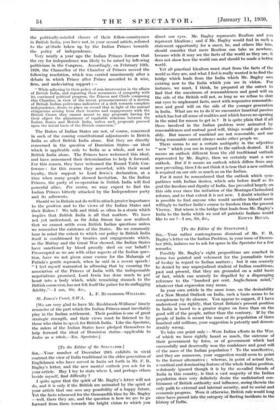[To the Editor of the SPECTATOR.]
Sin,—Your number of December 28th exhibits in vivid contrast the view of India traditional in the older generation of Englishmen who have served in India set forth in Mr. F. R. Bagley's letter, and the new mental outlook you ask for in your article. May I try to state where I, and perhaps others beside myself, find difficulty ?
I quite agree that the spirit of Mr. Bagley's letter will not do, and it is only if the British are animated by the spirit of your article that one sees any possibility of a happy future.
Yet the facts rehearsed for the thousandth time by Mr. Bagley —well, there they are, and the question is how we arc to go forward from them towards the bright vision to which you direct our eyes. Mr. Bagley represents Realism and you represent Idealism ; and if Mr. Bagley would find in such a statement opportunity for a sneer, he, and others like him, should consider that mere Realism can take us nowhere, because while it may see the facts of the world as they are, it does hot show how the world can and should be made a better world.
Yet all practical Idealism must start from the facts of the world as they are, and what I feel is really wanted is to find the bridge which leads from the India which Mr. Bagley sees existing now to the India which you see in vision. For instance, we must, I think, be prepared at the outset to find that the maximum of reasonableness and good will on the side of the British will not, so long as we refuse to shut our eyes to unpleasant facts, meet with responsive reasonable- ness and good will on the side of the younger generation in India. What are we to do if we encounter fanatical passion which has lost all sense of realities and which leaves no opening in the mind for reason to get in ? - It is quite plain that if all those involved in the Indian problem were animated by reasonableness and mutual good will, things would go admir- ably. But masses of mankind are not reasonable, and our being reasonable cannot always make other people so.
There seems to me a certain ambiguity in the adjective " new " which you use in regard to the outlook desired. If it means an outlook different from the old traditional outlook represented by Mr. Bagley, then we certainly want a new outlook. But if it means an outlook which differs from any now prevailing, then I do not think it is true that a new outlook is required on our side so much as on the Indian.
For it must be remembered that the outlook which sym- pathizes with Indian desires, which sets before itself as its goal the freedom and dignity of India, has prevailed largely on this side ever since the initiation of the Montagu-Chelmsford reforms, and to that extent it is not new. I doubt whether it is possible to find anyone who would sacrifice himself more willingly to further India's course to freedom than the present Viceroy. But where is the bridge that leads from Mr. Bagley's India to the India which we and all patriotic Indians would






































 Previous page
Previous page